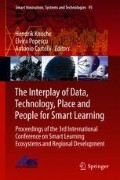Abstract
Technical educations often experience poor student performance and consequently high rates of attrition. Providing students with early feedback on their learning progress can assist students in self-study activities or in their decision-making process regarding a change in educational direction. In this paper, we present a set of instruments designed to identify at-risk undergraduate students in a Problem-based Learning (PBL) university, using an introductory programming course between two campus locations as a case study. Collectively, these instruments form the basis of a proposed learning ecosystem designed to identify struggling students by predicting their final exam grades in this course. We implemented this ecosystem at one of the two campus locations and analyzed how well the obtained data predicted the final exam grades compared to the other campus, where midterm exam grades alone were used in the prediction model. Results of a multiple linear regression model found several significant assessment predictors related to how often students attempted self-guided course assignments and their self-reported programming experience, among others.
Access this chapter
Tax calculation will be finalised at checkout
Purchases are for personal use only
References
Banas, J. R., Velez-Solic, A.: Designing effective online instructor training and professional development. In: Virtual Mentoring for Teachers: Online Professional Development Practices: Online Professional Development Practices, p. 1 (2012)
Bergmann, J., Sams, A.: Flipping for mastery. Educ. Leadersh. 71, 24–29 (2014)
Bloom, B.S., Engelhart, M.D., Furst, E.J., Hill, W.H., Krathwohl, D.R.: Taxonomy of educational objectives: the classification of educational goals. In: Handbook I: Cognitive Domain. David McKay Company, New York (1956)
Bøgelund, P., Justesen, K., Kolmos, A., Bylov, S.M.: Undersøgelse af frafald og fastholdelse ved medialogi og andre uddannelser ved det Teknisk-Naturvidenskabelige Fakultet 2015–2016: Arbejdsrapport Nr. 1. Aalborg Universitet (2016)
Cabrera, A.F., Nora, A., Castaneda, M.B.: College persistence: structural equations modeling test of an integrated model of student retention. J. High. Educ. 64(2), 123–139 (1993)
Casey, K., Gibson, P., Paris, I.: Mining moodle to understand student behaviour. In: International Conference on Engaging Pedagogy (2010)
Chang, M., Li, Y.: Smart Learning Environments. Lecture Notes in Educational Technology. Springer, Heidelberg (2015)
Cohen, G.L., Garcia, J., Purdie-Vaughns, V., Apfel, N., Brzustoski, P.: Recursive processes in self-affirmation: intervening to close the minority achievement gap. Science 324(5925), 400–403 (2009)
Dekker, G., Pechenizkiy, M., Vleeshouwers, J.: Predicting students drop out: a case study. In: Proceedings of Educational Data Mining (2009)
Duckworth, A.L., Quinn, P.D.: Development and validation of the short grit scale (Grit-S). J. Pers. Assess. 91(2), 166–174 (2009)
Dweck, C.S.: Self-theories: Their Role in Motivation, Personality, and Development. Psychology Press, Philadelphia (2000)
Evans, C., Palacios, L.: Interactive self assessment questions within a virtual environment. Int. J. e-Adoption (IJEA) 3, 1–10 (2011)
Giovannella, C.: Smart learning eco-systems: “fashion” or “beef”? J. e-Learn. Knowl. Soc. 10(3), 15 (2014)
Giovannella, C., Rehm, M.: A critical approach to ICT to support participatory development of people centered smart learning ecosystems and territories. Aarhus Ser. Hum. Centered Comput. 1(1), 2 (2015)
Glynn, J.G., Sauer, P.L., Miller, T.E.: A logistic regression model for the enhancement of student retention: the identification of at-risk freshmen. Int. Bus. Econ. Res. J. 1(8), 79–86 (2011)
Green, L.S., Banas, J., Perkins, R.: The Flipped College Classroom: Conceptualized and Re-Conceptualized. Springer, Heidelberg (2016)
Guerrero, W.: Flipped classroom and problem-based learning in higher education. In: Latin-American Context, Conference Proceedings. The Future of Education, p. 118 (2017)
Herzog, S.: Measuring determinants of student return vs. dropout/stopout vs. transfer: a first-to-second year analysis of new freshmen. In: Proceedings of 44th Annual Forum of the Association for Institutional Research (AIR) (2004)
Higher Education Research Institut: CIRP Freshman Survey – HERI (2017). https://heri.ucla.edu/cirp-freshman-survey/
Lassibille, G., Gomez, L.N.: Why do higher education students drop out? Evidence from Spain. Educ. Econ. 16(1), 89–105 (2007)
Leal, J.P., Queirós, R.: Using the learning tools interoperability framework for LMS integration in service oriented architectures. In: Technology Enhanced Learning, TECH-EDUCATION 2011 (2011)
Levitz, R.N.: Retention management system plus samples survey and report samples (2012). https://www.ruffalonl.com/complete-enrollment-management/student-success/rnl-retention-management-system-plus/samples
Mayer, R.E.: Principles for managing essential processing in multimedia learning: segmenting, pretraining, and modality principles. In: The Cambridge Handbook of Multimedia Learning, pp. 169–182 (2005)
Severance, C., Hardin, J., Whyte, A.: The coming functionality mash-up in personal learning environments. Interact. Learn. Environ. 16(1), 47–62 (2008)
Seymour, E., Hewitt, N.: Talking About Leaving. Westview Press, Boulder (1997)
Touron, J.: The determination of factors related to academic achievement in the university: implications for the selection and counseling of students. High. Educ. 12, 399–410 (1983)
Tsukayama, E., Duckworth, A.L., Kim, B.: Domain-specific impulsivity in school-age children. Dev. Sci. 16(6), 879–893 (2013)
Vygotsky, L.: Zone of proximal development. In: Mind in Society: The Development of Higher Psychological Processes, p. 157 (1987)
Yeager, D.S., Purdie-Vaughns, V., Garcia, J., Apfel, N., Brzustoski, P., Master, A., Hessert, W.T., Williams, M.E., Cohen, G.L.: Breaking the cycle of mistrust: wise interventions to provide critical feedback across the racial divide. J. Exp. Psychol. Gen. 143(2), 804–824 (2014)
Author information
Authors and Affiliations
Corresponding author
Editor information
Editors and Affiliations
Rights and permissions
Copyright information
© 2019 Springer International Publishing AG, part of Springer Nature
About this paper
Cite this paper
Christensen, B.C., Bemman, B., Knoche, H., Gade, R. (2019). Identifying Students Struggling in Courses by Analyzing Exam Grades, Self-reported Measures and Study Activities. In: Knoche, H., Popescu, E., Cartelli, A. (eds) The Interplay of Data, Technology, Place and People for Smart Learning. SLERD 2018 2018. Smart Innovation, Systems and Technologies, vol 95. Springer, Cham. https://doi.org/10.1007/978-3-319-92022-1_15
Download citation
DOI: https://doi.org/10.1007/978-3-319-92022-1_15
Published:
Publisher Name: Springer, Cham
Print ISBN: 978-3-319-92021-4
Online ISBN: 978-3-319-92022-1
eBook Packages: Intelligent Technologies and RoboticsIntelligent Technologies and Robotics (R0)

